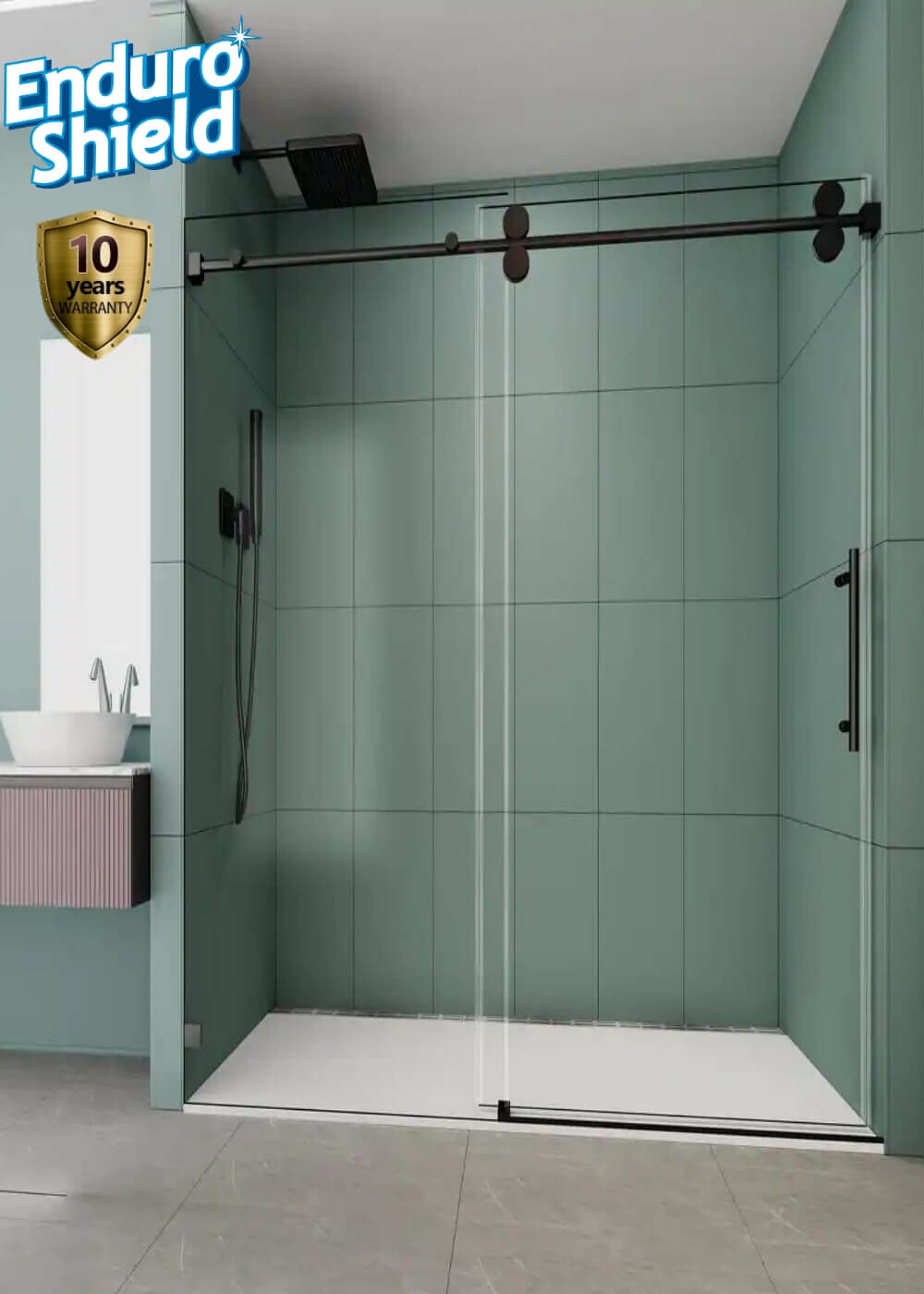
There are several options when it comes to choosing shower doors. However, one common difficulty that buyers often face is choosing between a sliding shower door and a hinged shower door. Both accomplish the task of keeping the water in a closed space, but beyond that, what makes each unique? We’ve put together this post to go over the advantages and disadvantages of both.
Sliding Shower Door
All sliding shower doors move from side to side.
From sliding configuration speaking: There are single sliding doors and double sliding doors. A single sliding door is made of one fixed panel and one sliding/movable panel. Double sliding door, also known as bypass shower doors, is made of two sliding/movable panels.
From frame speaking: There are frameless sliding door, semi-frameless sliding door, and framed sliding door. Usually, the most popular design in the market is a trackless or frameless sliding door. As it well combined the superior door performance with modern minimalist beauty, so it last years; The semi-frameless sliding door usually comes with one or two-track on the side, its the perfect balance of minimalist beauty and wall out-of-plumb adjustment. The framed sliding door usually comes with tracks at the bottom and the two vertical sides for easy installation purposes.
Sliding Shower Door Advantages:
* Perfect for small bathrooms: As they don’t open out, sliding shower doors provide an efficient space-saving solution. They’re ideal if you have a small bathroom where every bit of the area counts.
* Provides a seamless aesthetic look: Sliding glass doors, especially the frameless ones, don’t obstruct light and help convert your bathroom area into a coherent unit, no matter how complicated the space design is.
* Handles are functional: These shower doors typically offer handles that can also act as a towel bar. The handle usually spans the length of the door on one side.
* Make both sides of the tub/shower accessible: Double sliding shower doors have two glass doors that slightly overlap and either slide or roll open. This makes the tub accessible from both sides. So, you can turn on the water without having to step into the stall or tub.
* Bigger adjustment and DIY installation possible: It could be costly to hire someone to install for you. Most shower doors are at least 2-3” adjustable in width and offers wall out-of-plumb adjustment.
Sliding Shower Door Disadvantages:
* Heavy: The sliding shower door usually comes with more hardware than hinge door, thus its heavier and may require help during installation.
* Limited access space: As they’re fixed and the doors slide/roll into each other, the space to enter into the shower enclosure becomes limited. Usually bypass sliding door has wider opening.
Hinged Shower Door
These standard design doors swing out to open. Both framed and frameless options are available. To install frameless hinged doors, the two hinges on the side are drilled directly on to your bathroom wall.
Hinged Shower Door Advantages:
* Easy to clean and maintain: Hinged doors have less hardware like sliding doors. So, cleaning and maintaining these shower glass doors are easier than sliding doors.
* Maybe Larger opening: As hinged doors open out at least full 90 degrees, they provide a wider space into the enclosure. Also, the openings can be made larger with the use of additional side panels which makes them safer for people with mobility challenges.
* Provide aesthetic look: A frameless hinged shower door blends into the wall as the use of hardware like tracks, brackets and hinges are kept to a minimum. They help make the whole bathroom area look like a seamless single unit.
Hinged Shower Door Disadvantages:
* Not suitable for small bathrooms: As hinged doors open outward, it requires more space forward. This can be a problem if you have a small bathroom.
* Water may spill out: When the door is opened after a shower, water may spill out on the bathroom floor outside the enclosure. So, you’ll need to spend some time soaking up the water after coming out of the shower.
* Small or No adjustment: Hinged Shower Door doors usually offer up to 5mm in a total of the wall out-of-plumb adjustment, some even not.
* Professional installation required: As the hinged shower door doors offer little or no wall out-of-plumb adjustment, thus it requires professional installation for safety concerns
* Risk of sagging: As Hinged doors only have few hinges and wall clamps to support the weight of glass, especially the most-common 10mm glass in the market, it requires quality hardware and little amendment in the future with years goes by.
If you’re planning a bathroom renovation, the size/area of your bathroom is a significant factor when selecting a sliding or hinged shower door. The cost will depend on the type and thickness of the glass as well as on the frame, semi-frame and frameless options. All you need to think is what suits your style, needs and your bathroom!

Ready to install your new shower doors? For more information about our wide range of shower doors, call us today at 844 3682242 (Douccia) to get a free quote now!











